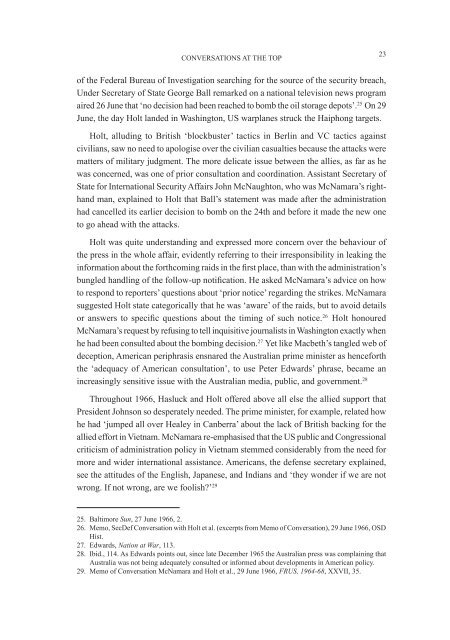conference proceedings - Australian Army
conference proceedings - Australian Army
conference proceedings - Australian Army
Create successful ePaper yourself
Turn your PDF publications into a flip-book with our unique Google optimized e-Paper software.
CONVERSATIONS AT THE TOP<br />
of the Federal Bureau of Investigation searching for the source of the security breach,<br />
Under Secretary of State George Ball remarked on a national television news program<br />
aired 26 June that ‘no decision had been reached to bomb the oil storage depots’. 25 On 29<br />
June, the day Holt landed in Washington, US warplanes struck the Haiphong targets.<br />
Holt, alluding to British ‘blockbuster’ tactics in Berlin and VC tactics against<br />
civilians, saw no need to apologise over the civilian casualties because the attacks were<br />
matters of military judgment. The more delicate issue between the allies, as far as he<br />
was concerned, was one of prior consultation and coordination. Assistant Secretary of<br />
State for International Security Affairs John McNaughton, who was McNamara’s righthand<br />
man, explained to Holt that Ball’s statement was made after the administration<br />
had cancelled its earlier decision to bomb on the 24th and before it made the new one<br />
to go ahead with the attacks.<br />
Holt was quite understanding and expressed more concern over the behaviour of<br />
the press in the whole affair, evidently referring to their irresponsibility in leaking the<br />
information about the forthcoming raids in the first place, than with the administration’s<br />
bungled handling of the follow-up notification. He asked McNamara’s advice on how<br />
to respond to reporters’ questions about ‘prior notice’ regarding the strikes. McNamara<br />
suggested Holt state categorically that he was ‘aware’ of the raids, but to avoid details<br />
or answers to specific questions about the timing of such notice. 26 Holt honoured<br />
McNamara’s request by refusing to tell inquisitive journalists in Washington exactly when<br />
he had been consulted about the bombing decision. 27 Yet like Macbeth’s tangled web of<br />
deception, American periphrasis ensnared the <strong>Australian</strong> prime minister as henceforth<br />
the ‘adequacy of American consultation’, to use Peter Edwards’ phrase, became an<br />
increasingly sensitive issue with the <strong>Australian</strong> media, public, and government. 28<br />
Throughout 1966, Hasluck and Holt offered above all else the allied support that<br />
President Johnson so desperately needed. The prime minister, for example, related how<br />
he had ‘jumped all over Healey in Canberra’ about the lack of British backing for the<br />
allied effort in Vietnam. McNamara re-emphasised that the US public and Congressional<br />
criticism of administration policy in Vietnam stemmed considerably from the need for<br />
more and wider international assistance. Americans, the defense secretary explained,<br />
see the attitudes of the English, Japanese, and Indians and ‘they wonder if we are not<br />
wrong. If not wrong, are we foolish?’ 29<br />
25. Baltimore Sun, 27 June 1966, 2.<br />
26. Memo, SecDef Conversation with Holt et al. (excerpts from Memo of Conversation), 29 June 1966, OSD<br />
Hist.<br />
27. Edwards, Nation at War, 113.<br />
28. Ibid., 114. As Edwards points out, since late December 1965 the <strong>Australian</strong> press was complaining that<br />
Australia was not being adequately consulted or informed about developments in American policy.<br />
29. Memo of Conversation McNamara and Holt et al., 29 June 1966, FRUS, 1964-68, XXVII, 35.<br />
23

















